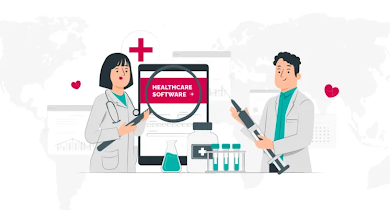White Label Healthcare CRM: Get a Free Live Demo Now

In the healthcare industry, customer relationship management (CRM) systems play a crucial role in streamlining operations, enhancing patient care, and improving communication. With the rise of white-label healthcare CRM solutions, healthcare providers now have the flexibility to customize and brand their CRM platforms according to their specific needs while maintaining data security and compliance with regulations like HIPAA. In this blog, we will explore the benefits of using a white-label healthcare CRM, how it works, and why it could be a game-changer for your practice or healthcare organization. Additionally, we’ll discuss how it integrates with other essential systems, such as check printing software, to improve operational efficiency.
What Is a White Label Healthcare CRM?
A white-label healthcare CRM is a ready-to-use customer relationship management system that can be rebranded and customized to suit the unique requirements of healthcare providers. The term “white label” refers to the ability to rebrand the CRM platform, allowing healthcare organizations to present it under their own brand identity without building the system from scratch. This is particularly beneficial for medical practices, hospitals, clinics, and other healthcare entities that need a CRM solution but do not want to invest significant resources into developing one.
These systems provide a seamless integration of patient management, appointment scheduling, billing, and communication features—all within a single platform. By adopting a white-label healthcare CRM, healthcare providers can deliver a personalized experience for their patients, improve engagement, and streamline administrative tasks.
Key Features of White Label Healthcare CRM
- Patient Management: A healthcare CRM enables the efficient management of patient records, ensuring that all information is centralized and easily accessible. White-label CRMs allow practices to tailor patient profiles with specific fields, such as insurance information, medical history, and visit notes, in a way that fits their operational requirements.
- HIPAA Compliance: For healthcare providers, maintaining HIPAA (Health Insurance Portability and Accountability Act) compliance is critical. The best HIPAA-compliant CRM software will ensure that all patient data is stored, managed, and transmitted securely. This includes encryption, secure login systems, and audit trails to track any access to sensitive data. By selecting a white-label CRM that adheres to HIPAA guidelines, healthcare organizations can mitigate the risk of data breaches and avoid legal complications.
- Appointment Scheduling: Scheduling appointments is an integral part of any healthcare practice. A CRM system that integrates with your practice’s calendar helps in automating appointment reminders, reducing no-shows, and improving overall patient flow. With a white-label CRM, healthcare organizations can customize the scheduling process to reflect their unique hours, services, and patient needs.
- Billing and Payment Processing: A key aspect of healthcare management is the ability to accurately and efficiently handle billing and payments. White-label healthcare CRMs often include integrations with payment gateways and invoicing systems to streamline the entire billing process. By automating invoice generation and payment tracking, healthcare providers can reduce administrative costs and improve revenue cycle management.
- Patient Communication: Effective communication is essential in healthcare. A CRM system allows healthcare providers to stay in touch with patients through email, text messages, and reminders. White-label CRMs can be customized with automated messaging flows to ensure that patients receive timely updates regarding appointments, test results, and other critical information.
- Analytics and Reporting: In a healthcare setting, having access to detailed analytics and reports can drive better decision-making. A white-label CRM offers customizable reports on patient demographics, appointment history, billing trends, and other essential metrics. These reports help providers identify patterns, optimize processes, and ensure continuous improvement in patient care.
Why Healthcare Providers Should Consider White Label CRM Solutions
Healthcare providers are increasingly turning to white label CRM solutions to manage their relationships with patients more efficiently. Below are some reasons why adopting a white-label healthcare CRM might be the right choice for your organization:
- Brand Customization: One of the primary advantages of a white label CRM is the ability to customize it with your branding. This ensures a consistent and cohesive experience for your patients, who will interact with the CRM under your practice’s name and logo.
- Cost-Effective: Developing a CRM system from the ground up can be time-consuming and expensive. With a white-label solution, healthcare organizations can save money by utilizing a pre-built platform that has already been tested and proven in the market. This reduces the need for expensive development costs while still providing a powerful tool to improve patient management.
- Quick Implementation: Unlike custom-built CRM systems, which can take months or even years to implement, white-label healthcare CRMs are typically ready for use out of the box. This means you can start benefiting from the platform almost immediately. Furthermore, many providers offer free demos to help healthcare organizations evaluate the software before committing.
- Integration with Existing Systems: Many healthcare practices already use a variety of other software solutions to handle tasks like billing, scheduling, and check printing. The best white-label healthcare CRMs offer integrations with other essential systems, such as check printing software, ensuring that all operations are aligned and data is transferred seamlessly between platforms.
Integrating Check Printing Software with White Label Healthcare CRM
One often-overlooked feature that a healthcare CRM can integrate with is check printing software. For many healthcare organizations, printing and mailing checks is a routine task, whether it involves issuing refunds to patients, paying vendors, or handling employee payroll. By integrating check printing capabilities directly into your white label CRM system, you can streamline this process and reduce the risk of errors.
Check printing software allows healthcare providers to print checks directly from the CRM system, ensuring accuracy in the amounts, payees, and other check details. It also enables users to print checks in compliance with industry standards, including MICR (Magnetic Ink Character Recognition) for banking purposes. This level of integration eliminates the need for manual entry and helps healthcare organizations save time and reduce administrative overhead.
For a detailed look at how check printing software can benefit your practice, visit Check Printing Software.
How to Get a Free Live Demo of White Label Healthcare CRM
When considering a white label healthcare CRM, one of the best ways to evaluate the platform is by taking advantage of free live demos. These demos provide hands-on experience with the CRM software, allowing you to explore the features, user interface, and customization options before committing to a subscription or purchase.
Most white label CRM providers offer free live demos as part of their sales process. These demos are typically conducted via a virtual meeting or webinar, where a representative will walk you through the CRM’s functionality, show you how to customize it to your brand and answer any questions you may have.
During the demo, make sure to ask about the software’s HIPAA compliance features, data security protocols, and any integrations with other systems you use, such as billing software or check printing solutions. This will help you ensure that the CRM aligns with your practice’s needs.
If you’re looking for a robust, HIPAA-compliant CRM solution, check out the Best HIPAA Compliant CRM Software. This platform ensures that your patient data is secure, while also providing all the features necessary for effective practice management.
Conclusion
Adopting a white label healthcare CRM can significantly improve the efficiency of your practice by streamlining patient management, communication, billing, and more. It offers the flexibility of customization, ensuring that the software works for your unique needs while maintaining compliance with HIPAA regulations. Furthermore, by integrating additional tools like check printing software, healthcare providers can further enhance their operational efficiency and reduce administrative burdens.
By opting for a white-label CRM, you not only save time and money but also enhance the overall patient experience, leading to improved patient satisfaction and better healthcare outcomes. Take advantage of free demos to explore the various options available and choose the best CRM platform that aligns with your needs.
Start your journey today by requesting a free demo of a white-label healthcare CRM that meets all your needs, including HIPAA compliance, check printing integration, and much more!


